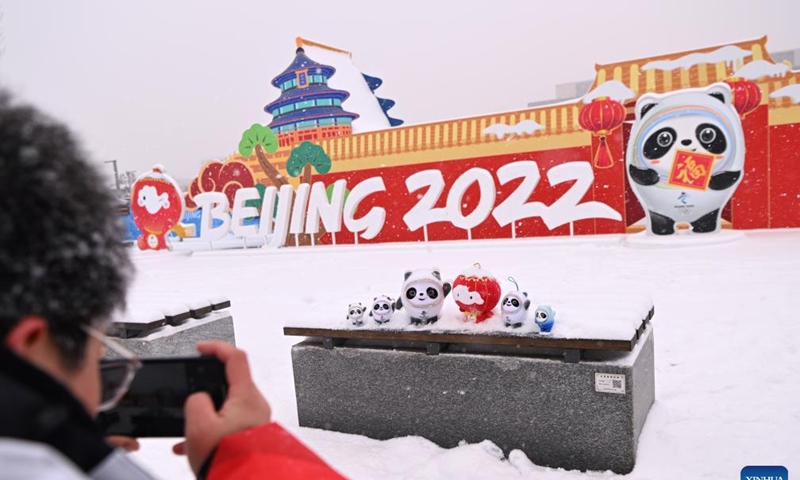Cloaked in self-delusion, Western elites fail to understand Beijing Olympics are more than spending and national pride

A man takes photos of the mascots of Beijing 2022 Winter Olympics ad Paralympics outside the Main Media Center of Beijing Winter Olympics in Beijing, capital of China, Feb. 13, 2022. (Xinhua/Wu Wei)
Is it worth hosting the Olympic Games? This is the question some in the West have been asking China even before 2008. In an attempted response, The New York Times (NYT) said on Monday that hosting the Olympics is "worth every billion" for China. It then went on to claim the scale of expenditure by China on the Beijing 2022 Winter Olympics has made the Olympic Games "less appealing to many cities around the world in recent years."Hosting the Olympics is indeed a big, costly affair, and it is also true that worries about the potential economic benefits have dampened the enthusiasm of many countries or cities bidding to host the Games.
Just take a look at how Beijing was chosen as host for the 2022 Winter Olympic Games. Many of Beijing's then-competitors, such as European cities Oslo and Stockholm, decided to withdraw from the 2022 bid due to costs concerns, and not because they no longer wished to host the Games. These cities were instead compelled to make such a decision because they were too divided to reach a societal consensus, or simply because they didn't have enough strength.
What is behind Beijing's seemingly easy success is China's strong hard power - economic strength, technology development, and capacity for infrastructure development - and "soft power," including the Chinese people's sense of unity and determination to achieve greatness. All of these combined advantages are rarely seen in other countries.
Yet, some Western media outlets decided to focus on how China is "spending money like water" for the Games and entirely disregarded to the quantifiable reasons for the country's success. This is how they usually deal with China's achievements: They bury their heads in self-delusion like a flock of ostriches.
Apart from focusing on the economic side of the Olympic Games story, the NYT article also questioned the role the Chinese national pride factor plays. It even quotes a political scientist from the Hong Kong Baptist University as saying: "For China's international image, prestige, and face, as the Chinese would say, nothing is too expensive."
In some people's narrow view, China hosting of the Winter Olympics is all about "saving face," a way to spend money to show China's exuberance and influence. According to this logic, since all confirmed Olympic host cities after the 2022 Games - Paris, the Italian cities of Milan and Cortina, Los Angeles, and Brisbane - are in the West, is it possible to say that these Western countries are using the Olympics to redeem their tarnished global image as a result of gross ineptitude and political hypocrisy?
The Olympic Games are, in fact, inextricably linked with national pride. Japan and South Korea have both strengthened their national pride by hosting the Olympics. The US is no exception: The 1984 Olympics in Los Angeles gave Americans a perfect opportunity to demonstrate their patriotism in the context of the Cold War.
The Olympics has provided the perfect stage for China and its people to display their prosperity and national pride. However, the Winter Games in Beijing this year are much more than that. The official motto "Together for a Shared Future" and how it was presented in the opening ceremony prove that the Games this year are not only a single-country event.
They are also dedicated to uniting the world and promoting peace. This is particularly important amid a global pandemic that has divided the world and hindered global cooperation.
Besides, most of the Winter Olympics are held in developed countries, and China, the largest developing country, is now able to do the same. This is also an inspiration to other developing countries.
Now as we pass the halfway mark of this year's Winter Games, it is believed that Beijing has provided an adequate response to speculations on whether it is indeed worth hosting the Olympics. And Beijing's answer should not be the concern of some Western elites. They should save such concern for if and when the West too hosts Games as successful as those hosted by Beijing.
The author is a reporter with the Global Times. opinion@globaltimes.com.cn



